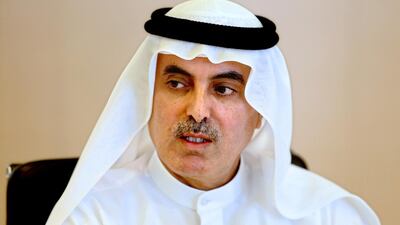Even as loans to small and medium-sized enterprises begin to sour, bank balance sheets are still growing and lending to small businesses will not stop.
That is according to bankers and observers, after Abdul Aziz Al Ghurair, the chairman of the UAE Banking Federation, warned that a number of small business owners might have fled the country this year, leaving unsettled debts of about Dh5 billion.
Observers noted that the Dh5bn of bad debts that Mr Al Ghurair said might be incurred by banks only made up about 0.4 per cent of total outstanding debts.
And although banks will have to increase their provisions for bad debts, they may still deliver increased earnings next year.
Total outstanding debts in the UAE amount to Dh1.4 trillion, according to the Central Bank’s latest figures.
“We have to take note of this, we can’t just ignore this and I think provisioning will increase,” said Jaap Meijer, the head of financial services research at Arqaam Capital, a Dubai investment bank.
“Overall earnings in the banking system may still increase next year. That’s still possible because the balance sheet growth is still there.”
Mr Al Ghurair, the chief executive of Mashreq Bank, did not elaborate on his warning, but observers said that much of the bad debts were likely to be concentrated in industries that have been hit hard by the slump in oil prices and includes companies affected by the Government's decreased spending on infrastructure projects.
Crude oil has lost about half its value since last June, buffeting the UAE which relies on crude sales to fund more than 60 per cent of its federal budget.
“There are certain industries that are disproportionately affected by skips and defaults,” said Craig Moore, the chief executive of Beehive, a peer-to-peer platform that brings lenders and borrowers together online, pointing to companies in the oil and gas supply chain, as well as the jewellery and food trading industries.
“It would be interesting to know how you break this by industry type. SMEs will continue to need finance. It shouldn’t spark any panic in the market,” said Mr Moore.
According to a survey last month by Gulf Finance, the SME lending arm of the Dubai investment bank Shuaa Capital, small businesses are becoming more pessimistic about the outlook for growth.
One of the biggest casualties of loans to small businesses of late has been United Arab Bank. The Sharjah bank said it swung to a third-quarter loss after a sharp rise in commercial loan defaults. It lost Dh272.6 million in the third quarter, compared to a profit of Dh169.2m in the same period last year.
In a statement to the Abu Dhabi stock exchange yesterday, the United Arab Bank said its board had accepted the resignation of Paul Trowbridge, the lender’s chief executive, and that Samer Tamimi would be the acting chief executive.
Despite the pessimism surrounding SMEs however, bankers said they remained committed to lending to the SME sector.
"SMEs are the backbone of the country's economy and [economic] cycles come and go," said Suvo Sarkar, Emirates NBD's head of retail banking. "It's a very key sector for us and we support it fully, both in terms of lending and in terms of all of the banking products that SMEs want. It will continue to be an important part of our business and for the entire banking sector."
mkassem@thenational.ae
Follow The National's Business section on Twitter

